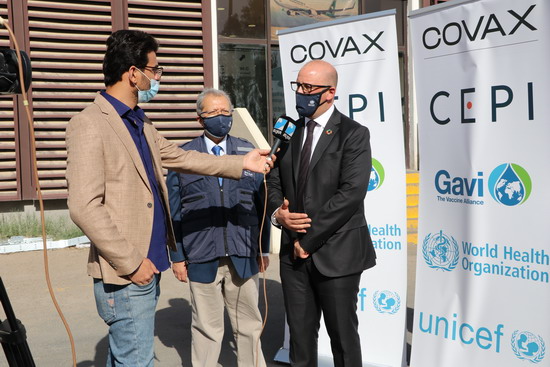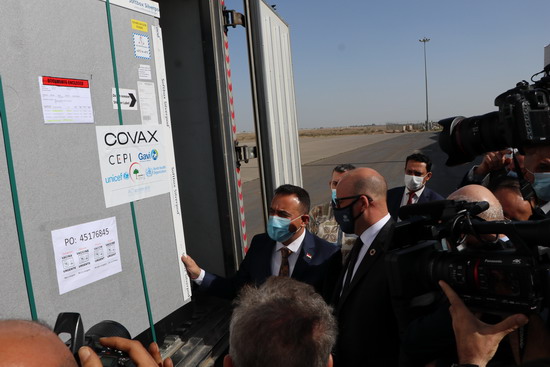 Baghdad, 25 March 2021 – Amid a global shortage of COVID-19 vaccines, Iraq has received 336 000 doses of the AstraZeneca COVID-19 vaccine through the COVAX Facility, a partnership co-led by Coalition for Epidemic Preparedness Innovations (CEPI), Gavi - the Vaccine Alliance, and the World Health Organization, alongside key delivery partner UNICEF.
Baghdad, 25 March 2021 – Amid a global shortage of COVID-19 vaccines, Iraq has received 336 000 doses of the AstraZeneca COVID-19 vaccine through the COVAX Facility, a partnership co-led by Coalition for Epidemic Preparedness Innovations (CEPI), Gavi - the Vaccine Alliance, and the World Health Organization, alongside key delivery partner UNICEF.
The AstraZeneca vaccines manufactured by SK-Bio Institute of South Korea arrived on Thursday 25 March 2021 and were received at Baghdad International Airport by the Minister of Health, Iraq, His Excellency Dr Hassam Mohammed Al-Tamimi, accompanied by representatives of the Ministry of Health, WHO, and UNICEF. This is a historic step towards the global goal of ensuring equitable distribution of COVID-19 vaccines worldwide and is part of the first allocation of vaccines to Iraq. Further consignments of 1.1 million COVAX vaccine doses are planned for Iraq in the coming weeks and will continue in order to cover 20% of the population before the end of 2021.
Iraq, as the rest of the world, will be dealing with the COVID-19 pandemic for some time to come. In Iraq significant transmission is ongoing and the rise in case numbers is putting enormous pressure on hospitals, intensive care units, and health workers. While the preventive measures can effectively reduce transmission of the virus, their effectiveness depends on strict application by all citizens. The arrival of the vaccines and the launch of a nationwide vaccination campaign will be a game-changer in the battle against COVID-19.
“Today, vaccines that were expected in the country since the last week of February have finally arrived. Although Iraq finalized all the COVAX Facility requirements in time, delays in the global production and shortages of vaccines within the COVAX Facility delayed this shipment. The vaccines received today have recently received the Emergency Use Listing from the World Health Organization and will be a game-changer in response to the COVID-19 pandemic in Iraq,” said His Excellency Dr Hassam Mohammed Al-Tamimi, Minister of Health, Iraq.
 The Ministry of Health will immediately dispatch these vaccines to all departments of health in Baghdad, in all governorates and Kurdistan to be used for protecting people within the priority groups according to the national vaccine deployment plan and framework,” continued His Excellency the Minister of Health.
The Ministry of Health will immediately dispatch these vaccines to all departments of health in Baghdad, in all governorates and Kurdistan to be used for protecting people within the priority groups according to the national vaccine deployment plan and framework,” continued His Excellency the Minister of Health.
“This is a historical landmark in response to COVID-19 in Iraq; receiving and utilizing these vaccines is a step in the right direction in controlling the pandemic in Iraq. Indeed, these vaccines have proven to be very safe and effective in preventing COVID-19 infections, with its associated risk of hospitalization and death,” said Dr Ahmed Zouiten, WHO Representative in Iraq.
“We wish to congratulate the Ministry of Health and the Government for all the efforts deployed in the response to COVID-19 in general and for securing the arrival of these life-saving vaccines in the country. As more vaccines are receiving WHO Emergency Use Listing, and more doses of vaccines are manufactured globally, we will be looking forward to receiving more allocations and more vaccines from the COVAX Facility in the coming weeks and months," added Dr Zouiten.
"UNICEF and WHO have been working with the Ministry of Health around the clock to make sure that Iraq has enough syringes, vaccination cards, and state-of-the-art cold chain facilities to store the vaccines safely, in anticipation of this day. We have also trained thousands of health workers in vaccination centres across Iraq. We have been waiting for this day for months. Vaccines are among the greatest advances of modern medicine. They are a protective shield, keeping families and communities safe," explained Mr Paul Edwards, UNICEF's acting Representative to Iraq.
While these vaccines are being rolled out, the Ministry of Health, WHO, and UNICEF urge all people in Iraq to continue observing public health measures that are in place, such as wearing masks at all times, physical distancing, air ventilation, proper hand hygiene, and avoiding congested gatherings and settings.
For more information, please contact:
Dr Saif M Badr
Ministry of Health and Environment
Mob: +9647901925907
Email:
Ms Pauline Loyce Ajello
WHO
Mobile: +9647818774262
Email:
Ms Baraa Shaba
WHO
Mobile: +9647800010244
Email:
Mr Innocent Kafembe
UNICEF
Mobile: 964 751 015 0949
Email:
Related link


